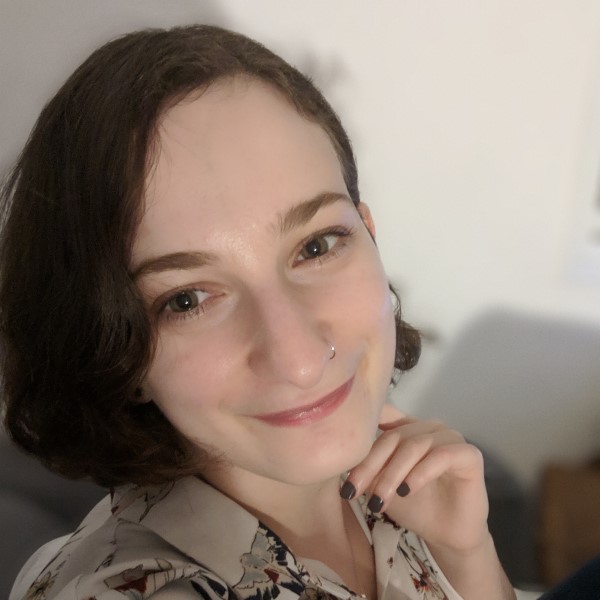Interviews with Olim
Each month, we interview an oleh or olah for our newsletter.
We invite you to read the stories of LGBTQ+ people who have made Israel their home.
"The only place where I ever felt truly at home."
Interview date: February 2019
Q. Where were you born and where did you grow up?
A. I was born and raised in a small Syrian-Jewish community in central New Jersey. My community is a little infamous for how insular and closed-off it is, but it was a really warm, culturally-rich environment to grow up in. I didn’t appreciate it properly until I left for college.
Q. At what age did you come out? And how did it go?
A. I started coming out as bisexual in high school, and only to close friends. It was a secret I generally kept to myself, especially coming from somewhere so conservative. It wasn’t until a couple years ago when I came out as gay (over the phone, a couple continents away) that it felt like a really big deal. It’s a little tough for my parents, but they’re getting used to it, and it was my little brother and my grandmother who were the most supportive.
Q. Were you involved at all in the LGBT community back home?
A. I was a member of my college’s Queer-Straight Alliance, but it wasn’t really helpful for me. I didn’t date at all, and while I was politically vocal about LGBT causes, I didn’t want to out myself through my activism.
Q. What is your involvement (if any) in the LGBT community in Israel?
A. During my second coming-out, my best friend encouraged me to join him in becoming a madricha in IGY, Israel’s LGBT youth group. I worked with 12-16 year-olds in Petach Tikva last year, and this year, we opened up IGY’s very first group for young olim, held entirely in English. We run weekly activities where 18-23 year-old LGBT olim can have a space to talk, learn, laugh, and build a community of likeminded friends. Get in touch with me if you want to join!
Through my work with IGY, I’ve attended protests, talks, seminars, and all sorts of activities that connected me with Israel’s LGBT community. And because I was never properly out in the states, it’s where I’ve really found myself and my identity.
Q. How long since you made Aliyah?
A. It’s been four and a half years now. I did a semester abroad at Tel Aviv University in college, and moved here immediately after graduating. I made Aliyah in the middle of Operation Protective Edge, which was the most hardcore reintroduction to Israel I could have had.
Q. Did you move here on your own or with family/friends/significant other?
A. I moved alone, but because I was already in Tel Aviv the year before, I had a few relatives and a long-distance boyfriend here waiting for me. The boyfriend and I split a couple years back, but it helped to have someone to help ease me into the Aliyah experience.
Q. Why did you make Aliyah?
A. Israel, and Tel Aviv specifically, was the only place where I ever felt truly at home in all of my identities. In America, I was always too religious or too secular, too Mizrahi or too westernized, or too queer. I never really fit in. Here, I’m just another Tel Avivi. Half the other madrichim from IGY are LGBT Mizrahi Jews who come from traditional homes. It’s an amazing feeling to be “typical” for once.
Q. How is it going so far?
A. Nothing normal happens here. Have you noticed that? I could write a book about all the weird things that have happened to and/or around me in this country.
Q. What do you do in terms of work?
A. After stints in Middle East research, strategic consulting, and marketing, I just started as a web editor for Haaretz. I’m really excited!
Q. How is your Ivrit?
A. Really good. I credit the army for that. I already came with a bit of a foundation from college, but it isn’t until you’ve shouted at an air force officer in Hebrew over the phone that you feel truly Israeli. The first time I did that, everyone else in the office went dead silent, and when I hung up, they clapped. I felt like I finally earned my teudat zehut.
Q. What has been your biggest challenge so far?
A. The army – everything from drafting to the right position to dealing with inept leadership to learning how to advocate for myself. They were the two hardest years of my life, and I don’t regret it at all. I met all my closest friends there. I don’t know how I’d function in this country without having had that experience.
Q. How do you perceive the Israeli LGBT community?
A. The Israeli LGBT community, olim and native-born alike, have really become my family over the past couple years. We have a ways to go when it comes to taking care of the underrepresented groups in the community, like our trans, religious, and Arab siblings, but we do know how to come together when we need to. Needing to really fight for our rights and recognition has made us so much stronger. I never felt like I was part of the LGBT community back home, but the Israeli community really took me in.
Q. How is being LGBT in Israel different to back home?
A. In Tel Aviv, it’s almost a given. When I came out to one of my cousins, she told me that it feels rare not to be LGBT here. In my community, it was something we never really talked about. We all knew of people, but no one ever said anything about it. If you couldn’t live a heterosexual lifestyle, you had to either struggle hard against the tide or find yourself a place outside of the community you grew up in. I feel almost spoiled here in how open I get to be, and I forget about it until I visit home and need to watch my words.
Q. If you were making aliyah now, would you do anything differently?
A. I would have packed more sundresses, less formalwear, and been a bit more diligent about my Hebrew homework.
Linda

Our Newsletter
Sign up if you would like to receive a monthly email listing events of interest to LGBT English-speakers in Israel, an interview with an oleh/olah and other useful information.
Want to be interviewed?
Complete the form below and we will get back to you.
Our Newsletter
Sign up if you would like to receive a monthly email listing events of interest to LGBT English-speakers in Israel, an interview with an oleh/olah and other useful information.
Want to be interviewed?
Complete the form below and we will get back to you.


